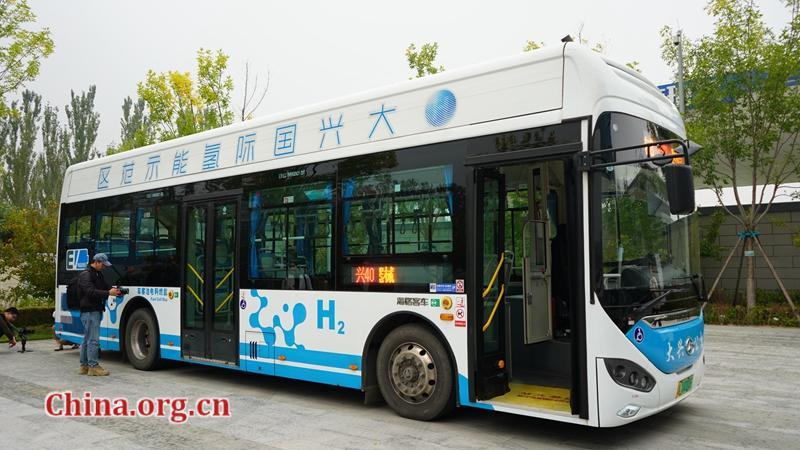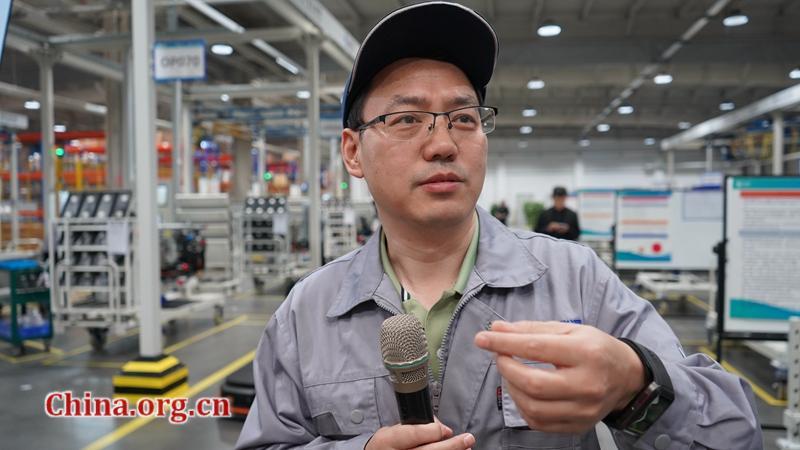
 0 Comment(s)
0 Comment(s) Print
Print E-mail China.org.cn, October 18, 2024
E-mail China.org.cn, October 18, 2024
Beijing is ramping up efforts to develop and commercialize hydrogen energy and fuel cell technologies, aiming to support China's goals of peaking carbon emissions by 2030 and achieving carbon neutrality by 2060.
As part of its initiative to move away from the traditional path of heavy dependence on energy and resources, the country is developing a clean and efficient transportation system in an all-round way, according to a white paper released by the State Council Information Office this August.
By the end of 2023, China had built almost 8.6 million electric vehicle charging facilities and over 450 hydrogen fueling stations nationwide, the white paper said.
Analysts expect hydrogen energy to have wide-ranging applications in the future.

A hydrogen-powered shuttle bus in the Daxing International Hydrogen Energy Demonstration Zone in Beijing, China, Oct. 13, 2024. [Photo by Liao Jiaxin/China.org.cn]
Beijing Sinohytec Co. Ltd., a national high-tech enterprise, is involved in fuel cell research projects and is collaborating with industry partners to build a hydrogen energy ecosystem in the Daxing International Hydrogen Energy Demonstration Zone in the Chinese capital. The company promotes the application and development of hydrogen technologies through the construction and operation of renewable energy hydrogen production plants and refueling stations.
Bao Jianpeng, deputy director of production and operations at Sinohytec, said the company has transitioned to domestically produced components for its hydrogen fuel cell systems, significantly reducing costs. In 2018, the company achieved a major breakthrough by developing fuel cells that operate stably at temperatures as low as minus 35 degrees Celsius.

Bao Jianpeng introduces Beijing Sinohytec Co. Ltd.'s efforts to advance hydrogen energy development in Beijing, China, Oct. 13, 2024. [Photo by Liao Jiaxin/China.org.cn]
As technology advances and costs decrease, hydrogen fuel engines are expected to become comparably priced with traditional diesel engines, Bao said.
Meanwhile, the Daxing International Hydrogen Energy Demonstration Zone has seen rapid development of hydrogen infrastructure in recent years. It is now home to the largest hydrogen refueling station in the world. According to a staff member of the station, with a daily refueling capacity of 4.8 metric tons, the station can meet the hydrogen needs of 800 fuel cell vehicles.
Xiang Yankuan, deputy director of the Daxing District Bureau of Economy and Information Technology, said that the demonstration zone was put into operation in 2021 and has established a comprehensive industrial ecosystem that integrates hydrogen production, storage, transportation, and refueling. Efforts are underway to transform it into a leader in industrial collaboration and a battleground for core technology breakthroughs, he said.
As the district steps up efforts to build a world-class model for hydrogen energy applications, Daxing will build itself into a benchmark in hydrogen innovation, a leader in green hydrogen initiatives, and a globally recognized hydrogen hub, he added.
Go to Forum >>0 Comment(s)